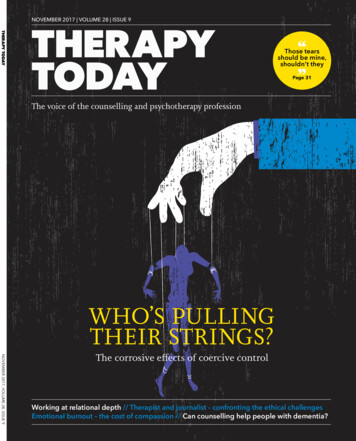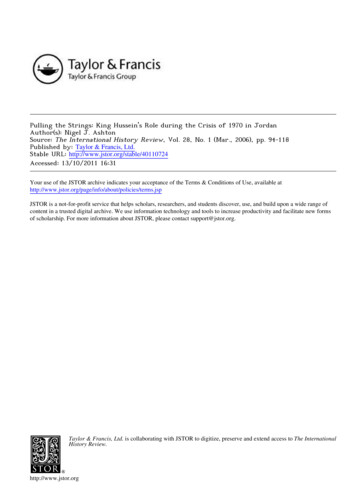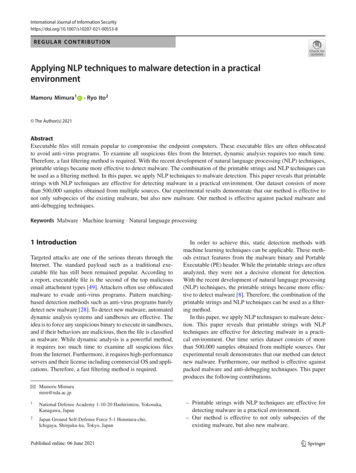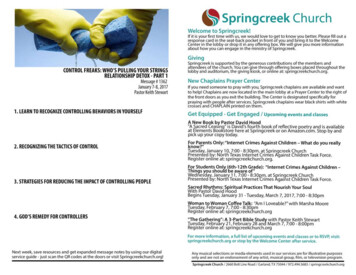
Transcription
NOVEMBER 2017 VOLUME 28 ISSUE 9THERAPY TODAYThose tearsshould be mine,shouldn’t theyPage 31The voice of the counselling and psychotherapy professionWHO’S PULLINGTHEIR STRINGS?NOVEMBER 2017, VOLUME 28, ISSUE 9The corrosive effects of coercive controlWorking at relational depth // Therapist and journalist – confronting the ethical challengesEmotional burnout – the cost of compassion // Can counselling help people with dementia?
WelcomeI first heard the term‘compassion fatigue’when used to explaina dramatic drop incharitable giving justafter Live Aid.COVER IMAGE: GETTYCHARLIE BESTApparently, the public couldn’tbear to look at any more footage ofthe human fallout of famine, war anddisease. Maybe they were self-caring?Emotional burnout is particularlydifficult for therapistsbecause working withfeelings and caring forothers is why we chosethis profession in thefirst place. As Dr LindaDubrow-Marshall pointsout in our cover feature,‘There can be shame inadmitting that we areexperiencing compassion fatigue,but we are human, and we are notprotected from stress just becausewe have therapeutic skills.’I too have felt this way. Now, if I lookat my diary and have to steel myselffor the week ahead, I know I need todecrease my client hours when I can,increase my self-care and take a breakasap. And breathe.Rachel Shattock DawsonConsultant EditorEditor Catherine Jacksone: catherine.jackson@thinkpublishing.co.ukConsultant Editor Rachel Shattock DawsonReviews Editor John Daniele: reviews@thinkpublishing.co.ukMedia Editor Bina Conveye: media@thinkpublishing.co.ukDilemmas Editor John Daniele: dilemmas@thinkpublishing.co.ukGroup Art Director Jes StanfieldArt Director George WalkerSub-editor Justine ConwayProduction Director Justin MastersGroup Account Director Rachel WalderManaging Director Polly ArnoldGroup Advertising Manager Adam Lloydsd: 020 3771 7203 m: 07725 485376e: adam.lloyds@thinkpublishing.co.ukEditor’s noteThe United Nations has designated 25 NovemberInternational Day for the Elimination of Violenceagainst Women. It also marks the start of a16-day period of activism against all genderbased violence. We are all invited to ‘orange theworld’, using the colour of the UN campaign tosymbolise a brighter future without violence.This campaign influenced our decision tocommission an article on coercive control forthis month’s issue. Coercive control is a relativelynew crime, in terms of UK law, but an age-oldand still widely misunderstood, pernicious formof violence, inflicted, largely, by men on women,within intimate relationships. But it is also found in other arenas, and usedby women too – in cults, for example, and in modern-day slavery, and,indeed, in parent–child relationships, work situations and others whereone person exerts power over others through emotional manipulationand threat. As the authors of the article point out, such clients are verylikely to come to counselling for some quite other reason, and it’s vital thatcounsellors are alert to the potential for this to be an underlying issue.We have some very interesting letters this month in response to thearticles in last month’s issue on the closure of the counselling coursesat the University of East Anglia and prescribed drug dependency. Theletters pages are your forum for engaging with issues that concern youand adding to the debates. I know a lot of discussion goes on outside themagazine, on Twitter and in Facebook groups, but do please write to usas well.Catherine JacksonEditor‘. an engaging read. thoughtful and wellwritten. presented in a lively and attractive way’Therapy Today is published on behalf of the British Associationfor Counselling and Psychotherapy by Think, Capital House,25 Chapel Street, London NW1 5DHt: 020 3771 7200 w: www.thinkpublishing.co.ukPrinted by: Wyndeham Southernprint, Units 15-21,Factory Road, Upton Industrial Estate, Poole BH16 5SNISSN: 1748-7846SubscriptionsAnnual UK subscription 76; overseas subscription 95(for 10 issues). Single issues 8.50 (UK) or 13.50 (overseas).All BACP members receive a hard copy free of charge as partof their membership.t: 01455 883300 e: bacp@bacp.co.ukBACPBACP House, 15 St John’s Business Park, Lutterworth,Leicestershire LE17 4HBt: 01455 883300 e: bacp@bacp.co.ukw: www.bacp.co.ukTHERAPY TODAYDisclaimer Views expressed in the journaland signed by a writer are the views of thewriter, not necessarily those of Think, BACP orthe contributor’s employer, unless specificallystated. Publication in this journal does notimply endorsement of the writer’s viewsby Think or BACP. Similarly, publication ofadvertisements and advertising material doesnot constitute endorsement by Think or BACP.Reasonable care has been taken to avoid errors,but no liability will be accepted for any errorsthat may occur. If you visit a website from a linkin the journal, the BACP privacy policy doesnot apply. We recommend that you examineprivacy statements of any third-party websitesto understand their privacy procedures.Case studies All case studies in thisjournal, unless otherwise stated, arepermissioned, disguised, adapted orcomposites, to protect confidentiality.3NOVEMBER 2017Copyright Apart from fair dealing for the purposesof research or private study, or criticism or review,as permitted under the UK Copyright, Designsand Patents Act 1998, no part of this publicationmay be reproduced, stored or transmitted in anyform by any means without the prior permissionin writing of the publisher, or in accordance withthe terms of licences issued by the CopyrightClearance Centre (CCC), the Copyright LicensingAgency (CLA), and other organisations authorisedby the publisher to administer reprographicreproduction rights. Individual and organisationalmembers of BACP may make photocopies forteaching purposes free of charge, provided thesecopies are not for resale. British Association for Counsellingand PsychotherapyABC total average netcirculation: 44,386(1 January to 31 December 2016)
Contents November 2017Here and nowNewsNews featureThe monthLettersNICK LOWNDES/IKON IMAGESThe big issuesWhat can I possibly achieve?Sonia Khan describes the challenges and rewardsof working with people with dementiaWhen your life is not your ownLinda Dubrow-Marshall and Rod Dubrow-Marshalloutline the corrosive effects of coercive controlMeeting at relational depthMick Cooper asks if we are any closer tounderstanding relational depthOn the sporting couchGary Bloom combines his roles of therapistand journalist in his radio show20‘Here was a dignified womanin her early 80s, desperatelyholding on to herself, camouflagingdeficits of memory, bewildered andfrustrated, struggling to understandwhat was happening to her. In time,I answered my own question aboutwhat I could achieve.’Sonia Khan meets her first client with dementia,at the start of a journey of profound learningNOVEMBER 2017 VOLUME 28 ISSUE 9RegularsTurning pointWisdom from experienceResearch into practiceLiddy Carver highlights research on the challengesfacing university counselling servicesDilemmasThe police want to see Ruth’s client recordsTalking pointWhat qualities do you seek in a supervisor?Self-careLynne Barnett turns to photography forstress releaseAnalyse meGraham Music answers our questionnaireTHERAPY TODAYYour associationThose tearsshould be mine,shouldn’t theyPage 31The voice of the counselling and psychotherapy professionFrom the ChairBACP round-upClassified, mini ads, recruitment, CPDOn the cover.Unloving bondsWHO’S PULLINGTHEIR STRINGS?NOVEMBER 2017, VOLUME 28, ISSUE 9What are the signs thata client may be subject tothe corrosive effects ofcoercive control?Page 24The corrosive effects of coercive controlCompany limited by guarantee 2175320Registered in England & Wales. Registered Charity 298361Working at relational depth // Therapist and journalist – confronting the ethical challengesEmotional burnout – the cost of compassion // Can counselling help people with dementia?01 COVER-NOVv7-cj SM V1-cjf.indd 130/10/2017 10:27This is your journal. We want to hear from you. therapytoday@thinkpublishing.co.ukTHERAPY TODAY5NOVEMBER 201768121620242834333840424474454651
In the newsOur monthly digest of news, updates and eventsGender identity concernAttempts to change people’s genderidentity through psychologicalinterventions are unethical, potentiallyharmful and not supported by evidence,leading psy-organisations and LGBTQIgroups have said.The groups, including BACP, UKCP,Pink Therapy, the Association of ChristianCounsellors, the British PsychoanalyticCouncil and the British PsychologicalSociety, have amended their originalMemorandum of Understanding (MoU)on conversion or reparative therapy(November 2015), which referred onlyto sexual orientation. The revised MoUspecifically includes gender identity.It states that ‘neither sexual orientationnor gender identity in themselves51%of men would godown the pub if theywanted to talk to afriend about a mentalhealth problembit.ly/2yze6kFare indicators of a mental disorder’. Italso commits the signatories to worktogether to address the wider issuesof raising public and professionalawareness of the risks of conversiontherapy, ensuring all new and existingtherapists have training in these issues,and ensuring that the research evidencerelating to reparative therapy is regularlymonitored and reviewed.Andrew Reeves, Chair of BACP, said:‘BACP in no way supports or condonesthe practice of conversion therapy andknows that the new memorandum willensure individuals are protected fromjudgmental and uninformed therapy.’The revised MoU can be downloadedfrom bit.ly/2zkSjL249%of people who havehad cosmetic surgerysay their decisionwas influenced bysocial mediabit.ly/2zA3Gzo54%of primaryschoolteachers don’tfeel adequately trainedto help a child with amental health problembit.ly/2gN4Tff87,000people used Scotland’sNHS 24 mental healthfirst-response telephoneand online supportservices last yearbit.ly/2yulYngMental health first aid campaignThe Government has announced a new, 15 million programme totrain one million people in England in ‘mental health first aid’ skills.The campaign will be designed and delivered by Public HealthEngland, working with Mental Health First Aid England and othermental health organisations. The aim is to improve people’s personalresilience and give them the skills and confidence to recogniseand respond to others when they have mental health problems.It will include an online learning module designed to improvethe public’s knowledge, skills and confidence aboutmental health so they can assess their own mentalwellbeing and learn techniques to reduce stress,as well as feel better equipped to support others.The campaign will launch next year and run forthree years. bit.ly/2yu7vHTTHERAPY TODAY6NOVEMBER 2017
How do we knowcounselling works?SHUTTERSTOCKDoubtsabout couplecounsellingMost couples don’tthink couple therapyworks, a new survey bythe charity TavistockRelationships has found.The YouGov survey ofover 2000 adults foundthat 64% of people inlong-term, committedrelationships wouldnot seek help from acouple counsellor iftheir relationship wasin difficulty.The most commonreason, given by 43%,was that they didn’tthink that coupletherapy would work.However, 36% saidthey would try it if theywere provided withevidence that it had thepotential to improvetheir relationship.‘The idea that coupletherapy doesn’t workis simply not true – andthe evidence is clearon this,’ TavistockRelationships ChiefExecutive AndrewBalfour said.‘We need to start anational conversationabout the importanceof getting help for ourcouple relationships.Many who need suchhelp are not seeking it.‘The consequencesof this are far-reachingfor the adult partnersinvolved as well asfor their children andfuture generations.’bit.ly/2yw1DP4Bullyingand resilienceA new study has found that the harmful effects of bullyingon children lessen over time, thanks to their own resilience.The study used data on 11,108 children from the Twins EarlyDevelopment Study (TEDS), based at King’s College London,which allowed researchers to separate out genetic andenvironmental influences. Children and their parents filledout questionnaires about peer bullying at ages 11 and 14,and about mental health difficulties at ages 11 and 16.The researchers found that exposure to bullying causesanxiety, depression, hyperactivity and impulsivity, inattention andconduct problems at the time, and that anxiety can persist for atleast two years. But, by five years, all these effects have stopped,although 16-year-olds who have been bullied at age 11 remainmore vulnerable to paranoia or cognitive disorganisation.‘While our findings show that being bullied leads todetrimental mental health outcomes, they also offer a messageof hope. In addition to interventions aimed at stopping bullyingfrom happening, we should also support children who havebeen bullied by supporting resilience processes on their path torecovery,’ the study’s lead author, Dr Jean-Baptiste Pingault, said.bit.ly/2ybPQ60Depression in childhoodParents can have a very different perception of theirchildren’s mental wellbeing to that of their children,new research reveals.Researchers from the UCL Institute of Educationand the University of Liverpool analysed data fromthe Millennium Cohort Study of 10,000 childrenborn in 2000/01. Parents’ reports of their children’semotional problems were roughly the same for boysand girls throughout childhood, increasing fromseven per cent of all children at age seven to 12% atage 11. By age 14, 18% of girls were reported to haveemotional problems, compared with 12% of boys. Atthis age, the children were invited to self-report theirmental wellbeing, and 24% of girls reported symptomsof depression, but only nine per cent of boys.THERAPY TODAY7NICE should be drawing ona wider range of evidence,in addition to randomisedcontrolled trials (RCTs), toinform its guidelines, a paperpublished in the BACP journalCounselling and PsychotherapyResearch (CPR) says.Written by BACP researchersJo Pybis and Naomi Moller andProfessor Michael Barkhamof the University of Sheffield,the paper criticises both theevidence and the methodsused by NICE to review itsguideline for depression inadults, which is currently outfor consultation.There is, they say, a lackof high-quality RCTs directlycomparing counselling withother treatments. They alsoargue that NICE should drawmore widely on evidencesuch as the wealth of dataon patient outcomes andexperience collected by IAPTservices, and on qualitativedata from service users.The paper reviews theevidence for counselling fordepression, using these widerdata sources, and finds that itis equally as effective as CBT.bit.ly/2yvwXx7Anna Feuchtwang, Chief Executive of the NationalChildren’s Bureau, which jointly published thereport, said: ‘Worryingly, there is evidence thatparents may be underestimating their daughters’mental health needs. Conversely, parents may bepicking up on symptoms in their sons that boysdon’t report themselves.’The data also revealed clear links between familyincome and depression, and differences betweenethnic groups. Children from better-off families wereless likely to have depression at age 14. Girls frommixed and White ethnic backgrounds and boys frommixed and other ethnic groups were more at risk ofdepression; Black African girls and Bangladeshi andIndian boys were least at risk. bit.ly/2hifDVJNOVEMBER 2017
Self-careBurnout.the high cost of caring?Burnout is an ever-present risk in the caring professions. Sally Browntalks to counsellors about their experiences, and how to avoid itEmma,* a London-basedcounsellor in private practice,realised all was not well when shefound herself unable to make decisions.‘Even small, inconsequential decisions,like what to do at the weekend, began tofeel overwhelming,’ she says. Qualifiedfor just six months, she decided to ‘dipher toe’ into private practice. ‘Peoplesaid it would take time for my caseloadto grow, which suited me,’ she says.But, within weeks she had 16 clientsand was feeling overwhelmed.‘People would say, “You’re doinggreat!” But it didn’t feel great. It felt toomuch. I wish I’d been told to approachit like running a marathon – you need tobuild up to a large caseload, rather thanaiming to get a full caseload straightaway, because it is totally different toany other job in terms of the emotionaland physical demands.’Emma had what she calls a ‘minibreakdown’, where she withdrew fromher social life and felt increasinglyanxious and fearful. She came close togiving up, but, after a planned holiday,put some changes in place, includingreducing her client load and changingher working hours, which made itpossible to carry on. ‘It’s not easy, as it’smy sole source of income, but I realisedthat the number of clients I take on can’tbe determined by finances,’ she says.We may be mental healthprofessionals, but counsellors don’talways ‘walk the talk’, and it’s all tooeasy to focus on improving our clients’self-care and neglect our own. Evenwith an awareness of compassionfatigue and the impact of vicarioustrauma, we can think ‘it won’t happento me’. ‘Counsellors find it hard to admitwhen they are struggling. It’s similarto what I see in first responders andmedical staff – there can be a sharedculture of being strong, here to helpothers,’ says Fiona Dunkley, BACPsenior accredited counsellor andtrauma specialist. ‘We sacrifice ourself-care for the greater cause.’We can also fall into the trap ofthinking that, because the lives of ourclients are so awful, our needs pale bycomparison, says Lisa Jenner, a BACPaccredited counsellor and supervisor,who also delivers training on preventingvicarious trauma. ‘We can be blind tothe impact on ourselves until it’s almosttoo late. It’s often friends and familymembers who recognise that we arestruggling before we do.’Nor is it necessarily about size ofcaseload; a manageable caseload can‘People started to bring my attention to my memoryand concentration problems. I was still able to be verypresent for my clients, but, outside the counsellingroom, I couldn’t follow a conversation. It wasdisorientating, and I got very irritable with myfamily and people close to me’THERAPY TODAY8NOVEMBER 2017be tipped over into unbearable by justone client presenting with particularlyacute or distressing needs.Jenner herself didn’t realise thatwhat she dismissed as ‘tiredness’ andthe effects of juggling full-time workand family life were the warning signsof burnout. ‘People started to bringmy attention to my memory andconcentration problems. I was stillable to be very present for my clients,but, outside the counselling room,I couldn’t follow a conversation. It wasdisorientating, and I got very irritablewith my family and people close tome. Then, when I was driving, I wouldsuddenly forget which pedal didwhat. I saw my GP and ended up inan MRI scanner and being tested forAlzheimer’s. Then, when everythingwas ruled out, it became clear I wassuffering from stress and burnout.’What is burnout?Burnout is a ‘syndrome of emotionalexhaustion, depersonalisation andreduced personal accomplishmentthat can occur among individuals whodo “people-work”,’ explains ProfessorChristina Maslach, the US psychologistwidely known for her pioneeringresearch in this field and co-creatorof the Maslach Burnout Inventory.1She first came across it in the late1970s, when she was an assistantprofessor at the University of California,Berkeley, and researching how peoplein the emergency services, hospitalsand psychiatric units responded tochallenges at work. ‘I stumbled acrossit in the interviews I was doing. Apattern emerged – people talked about
GETTY IMAGES/ GARY WATERS‘If everyone else seemsoutwardly confident andcompetent, we look aroundand think, “I have to puton my happy face and notlet anyone know I’m notdoing as well”’feeling overwhelmed, emotionallyand physically exhausted, and losingtheir sense of compassion. But whenI first wrote an article about it, it wasfor a magazine, not a journal, becauseno journal was interested in it. Theydismissed it as “pop psychology”. Butthat article got sacks of mail from peoplesaying, “this is happening to me.” A lotof people had been struggling on,thinking it was just them, and theycouldn’t let anyone know. If everyoneelse seems outwardly confident andcompetent, we look around and think,“I have to put on my happy face andnot let anyone know I’m not doing aswell.” But once we become more opento talking to each other, we realise wearen’t the only one feeling this way.’What differentiates burnout fromexhaustion, depression or anxiety, isoften the most devastating symptomfor therapists – compassion fatigue: theloss of a sense of caring about clients,or feeling irritated by their problems.‘There can be shame in admittingthat we are experiencing compassionfatigue, but we are humans, and we arenot protected from stress just becausewe have therapeutic skills,’ says Dr LindaDubrow-Marshall, BACP-accreditedcounsellor and lecturer in psychologyat the University of Salford. ‘Admittingthis means we can address these issues.’Another insidious and underminingsymptom is a sense of hopelessnessabout the efficacy of our work, saysProfessor Thomas Skovholt, educationalpsychologist at the University ofMinnesota and author of The ResilientPractitioner.2 ‘We can feel less intensityin offering hope for the demoralisedclient, and a loss of a sense of thework being meaningful.’Other symptoms vary from individualto individual. I know I am becomingemotionally ‘knocked off balance’ by aclient’s material when I lose tolerancefor any other ‘drama’ outside thecounselling room, including plot linesin TV programmes and films.‘ When youhave absorbed an amount of traumaTHERAPY TODAY9NOVEMBER 2017vicariously, you can find that you nolonger have the capacity to absorb it inentertainment,’ says Dunkley. ‘I am verymindful of what I expose myself to insocial media and TV. I am exposed toenough trauma in my work, so I have towatch what I absorb in my personal life.Trauma is very related to adrenaline,so you can become overloaded.’For others, burnout shows up in thebody – we find ourselves more prone tobugs and viruses, or physical symptoms.‘We need to listen to our body as it holdsa wealth of information,’ says Dunkley.‘We might be telling ourselves to keepgoing, but our body will be tellingus to slow down by creating physicalsymptoms, aches and pains or illness.’The toxic environmentBut there is a danger in being tooprescriptive about ‘typical’ symptomsof burnout, and therefore medicalisingthe condition, believes Maslach. ‘Thatwas never the aim of my research.What worries me about making it intoa “mental illness” is that it is essentiallysaying something about the individual– that they have a disease, they have aproblem, so we have to fix the person.We should also be thinking about whatis going on in the work environment.Burnout is a regular, chronic, everydayexperience at work that wears you away,so that you can’t deal with stressors asyou would normally.’Maslach’s research has identifiedsix factors that make burnout morelikely: work overload, lack of control,insufficient rewards, breakdown ofworkplace community, absence offairness, and value conflict.1
Organisational conflict is anotherrisk factor, says Skovholt. ‘Internalconflict, especially among seniormanagement, increases the risk ofburnout. I have come across this evenin senior therapists – we are supposedto be experts on human development,and these people are fighting andhating each other. That can be reallydistressing for the counsellors they aremanaging and supervising. It’s also hardwhen your values don’t match those ofthe organisation you are working for.Anything that takes away the meaningof the work or the sense of fairness orjustness increases the risk of burnout.’For Helen,* it was a sense of notbeing valued that undermined herwellbeing when she was working asa counsellor for a national charity. ‘Itseems crazy now I look back on it,given that the charity was national andhigh profile, but I didn’t feel supportedor that the work I was doing wasvalued. As an organisation, there wasan awareness of vicarious trauma, butnothing was put in place to prevent it.I didn’t have enough supervision and,as I worked out in the field, I felt isolatedfrom my colleagues. I also wasn’t paidvery much, and that made me feelunappreciated. But it was my first jobafter qualifying, and I felt lucky to get it,so I didn’t question the conditions. Bythe time I felt confident enough to thinkit wasn’t right, the environment hadundermined my resilience and I wasfinding it increasingly hard to deal withclients’ material. I had nightmares aboutmy clients, became exhausted, andstopped eating and sleeping properly.All I wanted to do outside of work waszone out in front of the TV. In the end,I felt I had no choice but to leave.’Skovholt has also explored this,with his colleague, Michael HelgeRonnestad, in their book, TheDeveloping Practitioner.3 They describehow newly qualified practitionersin relationship-intense professionscan easily become overwhelmed bythe emotional demands of the work,especially in the early weeks andmonths, and can be driven to takean ‘early exit’, although most adjustand continue in their career.‘Internal conflict,especially among seniormanagement, increasesthe risk of burnout. I havecome across this even insenior therapists – we aresupposed to be experts onhuman development, andthese people are fightingand hating each other.It’s also hard when yourvalues don’t match thoseof the organisation youare working for’Grief and uncertaintyAspects of the work itself canalso put the counsellor at risk –notably, according to Skovholt, the‘accumulation of unresolved grief’.‘A therapist–client relationship is ahuman relationship. As therapists, weare always being left by our clients,’he says. ‘We have to let go of them,but what do we do then? Do we thinkabout them? And we also have tokeep up the capacity for new clients.We have to keep making attachmentsbut we are always losing them.’Another key factor is feeling youare not making a difference withclients. ‘Burnout is related to unclear,disappointing outcomes. It’s hard tosustain work where the results aren’tconcrete,’ he says. Dr Els van Ooijen,supervisor, trauma specialist, andwriter, agrees that it’s important tomonitor your sense of ‘doing a goodjob’. She says: ‘Working outside of yourexperience and capability is extremelyundermining. But, in organisations,counsellors can be in a situation wherethis feels unavoidable.’There is also the ever-present elementof anxious uncertainty from not knowingwhat work with a new client will involve.It can be particularly difficult if we havepersonal issues that are causing usdistress when clients present with similarTHERAPY TODAY10NOVEMBER 2017issues, says Dubrow-Marshall. ‘Whenmy father died, I did not want to take onnew clients who were coming to work ongrief issues. Some family members werealso demanding of me during that time,so I took a short break from working withvery demanding clients, which allowedme to recover and heal. I also undertookpersonal therapy, and got outside inputwhen I was ready to return to a moredemanding and challenging practice.’Protection and preventionBabette Rothschild, in Help for theHelper,4 suggests varying the intensityof empathy in sessions as a protectivemeasure. Skovholt says counsellorsshould aim simply to be a ‘goodenough counsellor’, and know when aB effort is enough for a client, ratherthan A . He says that experiencedcounsellors often operate with‘boundaried generosity’. ‘Being aneffective therapist requires boundaries,but also generosity and willingnessto give only so much,’ he says. ‘It’s likethe advice about oxygen masks on anairplane – you have to put on your ownbefore you can help anyone else.’Maslach talks about the ‘detachedconcern’ used by medical professionalsas a burnout defence. Of course,detachment is more difficult fortherapists, for whom ‘putting ourselvesinto our clients’ shoes’ is core to ourwork. ‘You can work with “one foot in,one foot out”, rather than both feet in,’says Dunkley. ‘With both feet in, you aretoo meshed with the client, and may notbe the most effective in helping them.’But it’s not easy. ‘I have experimentedwith Rothschild’s “varying the intensity”with clients and it just isn’t possible forme,’ says Jenner. ‘I can’t focus on theclient and also hold something backfor my own self-care. In the past, I havegot over-involved; I’ve followed clients’court cases to the point where I feltlike I was also going through it withthe client. I no longer do that. ButI’ve realised I can’t control my levelof empathy, so my self-care needs tofocus on what I do after sessions.’‘Care for self’ is one of six coreprinciples that underpin our workas counsellors; ‘resilience’ is one of
Self-care‘You need to find a way tosymbolically shake off theenergy that you have takeninto your body. SometimesI mindfully wash myhands, or do a simplebreathing exercise, orsome yoga moves’Sally BrownAbout the authorSally Brown is acounsellor and coachin private practice(therapythatworks.co.uk),a freelance journalist,and Executive Specialistfor Communicationfor BACP Coaching.risk of burnout in the future, includingreducing her counselling days. ‘Mysabbatical reaffirmed that I loved beinga counsellor, and I wanted to remain acounsellor, but doing it full-time wasn’tsustainable for me in the long term,’she says. ‘I now see clients on twodays a week, and focus on trainingand writing on the others, which affectme in a different way.’Multiple roles can give a sense ofperspective, agrees Skovholt. ‘Over theyears I have thrived on doing teaching,supervision, therapy, research, andwriting. But it doesn’t work for everyone– for some, it just adds to their senseof being overwhelmed.’We also need to give some thoughtto what we do in our leisure time, hebelieves. ‘In my research, one of thethings that has
When your life is not your own Linda Dubrow-Marshall and Rod Dubrow-Marshall outline the corrosive effects of coercive control Meeting at relational depth Mick Cooper asks if we are any closer to understanding relational depth On the sporting couch Gary Bloom combines his roles of therapis










